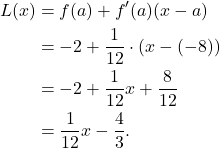Problem 118: Find the linearization ![]() of the function at
of the function at ![]() .
.
(1) ![]()
Solution: The linearization is given by ![]() . Thus we will find the pieces of the formula and then assemble them. That is,
. Thus we will find the pieces of the formula and then assemble them. That is,
(2) ![]()
We must now find the derivative evaluated at ![]() .
.
(3) ![Rendered by QuickLaTeX.com \begin{align*} f(x) & = x^{1/3} \\ f'(x) & = \frac{1}{3} \cdot x^{-2/3} \\ & = \frac{1}{3} \cdot \frac{1}{x^{2/3}} \\ & = \frac{1}{3} \cdot \frac{1}{\sqrt[3]{x^2}} \end{align*}](https://1problematatime.com/wp-content/ql-cache/quicklatex.com-862d875e174b44ce53e205f8f673fd98_l3.png)
Hence,
(4) ![Rendered by QuickLaTeX.com \begin{align*} f'(x) & = \frac{1}{3} \cdot \frac{1}{\sqrt[3]{x^2}} \\ f'(a) & = \frac{1}{3} \cdot \frac{1}{\sqrt[3]{(-8)^2}} \\ & = \frac{1}{3} \cdot \frac{1}{\sqrt[3]{64}} \\ & = \frac{1}{3} \cdot \frac{1}{4} \\ & = \frac{1}{12}. \end{align*}](https://1problematatime.com/wp-content/ql-cache/quicklatex.com-c95c2ffdf62312f789bc5b0e5c711044_l3.png)
One can now find the linearization.
(5) 
Therefore,
(6) ![]()

Leave a Reply